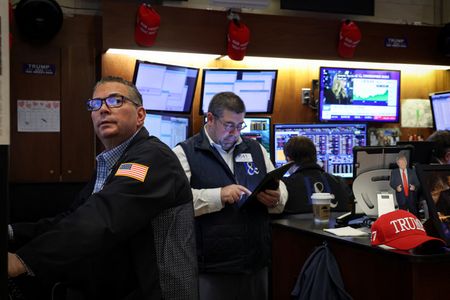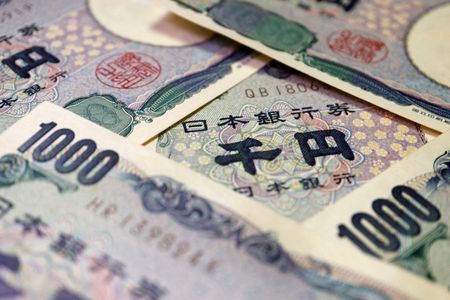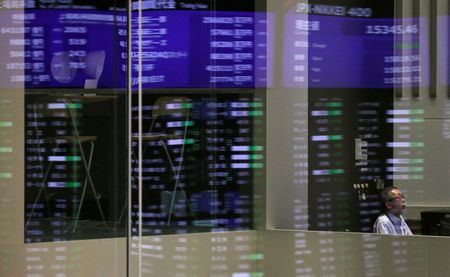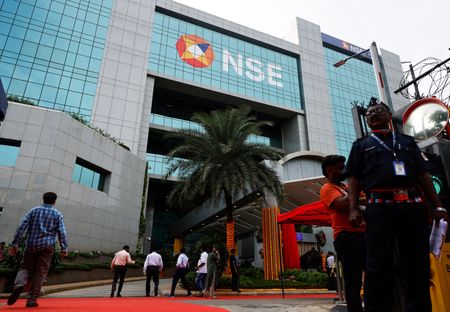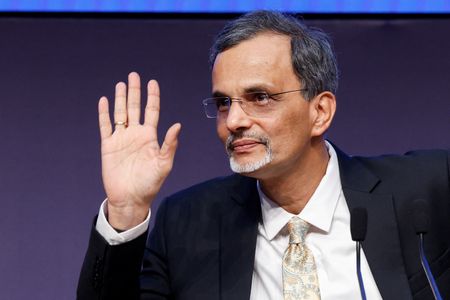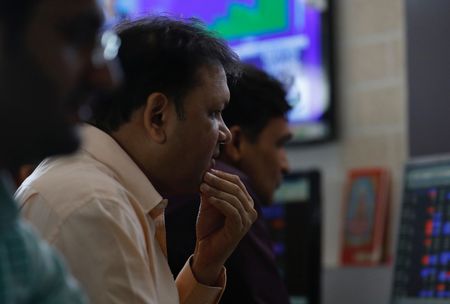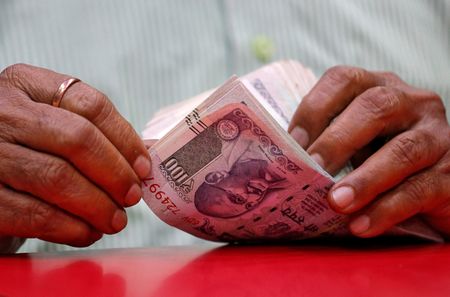By Chibuike Oguh and Marc Jones
NEW YORK/LONDON (Reuters) – Global equity markets fell while gold prices surged on Thursday, with traders marking one month since U.S. President Donald Trump’s returned to the White House and five years since COVID-19 first rocked world markets.
Gold was nearing $3,000 per ounce on concerns Trump will unleash a global trade war. Bullion notched its tenth record high this year, partly fueled by safe-haven demand amid the tariff threats.
The dollar was subdued against major currencies while the yen stomped higher on bets of more Bank of Japan interest rate hikes.
Trump’s latest tariff warning on Wednesday focused on pharmaceuticals, semiconductor chips and wood. He also intends to hit car imports as soon as April 2. That, along with other threats, has exacerbated fears of a broad trade war and unnerved investors.
On Wall Street, all three main indexes finished lower, led by losses in financials, consumer discretionary, consumer staples, communications services, industrials and materials. Energy, real estate and healthcare equities ended higher.
The benchmark S&P 500 hit a second straight record closing high this week on Wednesday, after the Federal Reserve’s January meeting minutes showed officials expressing concern about inflation and Trump’s policies.
“There’s been some volatility at least in the headlines and that’s beginning to sip into the market, with the equities indexes still bumping along their highs,” said Wasif Latif, president and chief investment officer at Sarmaya Partners.
“The market just needs to come to terms that this is the new environment that we are in; just like we saw in the prior Trump administration, over time the market will begin to discount and adjust to some of the headlines.”
The Dow Jones Industrial Average fell 1.01% to 44,176.65, the S&P 500 fell 0.43% to 6,117.52 and the Nasdaq Composite fell 0.47% to 19,962.36.
The pan-European STOXX 600 index fell 0.2%. Germany’s DAX lost 0.5%. Europe’s biggest economy is also set for a snap election at the weekend, following the collapse of Chancellor Olaf Scholz’s three-way coalition, with analysts anticipating a Conservative-led two-party coalition.
MSCI’s gauge of stocks across the globe dropped 0.30% to 884.15.
DICTATOR TRADE
Ukraine’s government bonds tumbled after Trump caused widespread alarm on Wednesday by calling Ukrainian President Volodymyr Zelenskiy a “dictator” and saying he needed to move fast to secure peace or risk having no country left.
Foreign ministers from the G20 top economies were meeting in South Africa. Top U.S. officials have snubbed the gathering and media reports on Thursday said the U.S. had opposed calling out Russian aggression at a virtual G7 meeting on Monday.
Mirabaud’s head of emerging market debt, Daniel Moreno, said expectations that Trump would drive a peace deal that provided Ukraine with long-term security have all but been dashed.
“The way that things are developing (with U.S-Russia talks and Trump criticisms) the market is now realizing that is not the base case anymore.”
“Trump is not indicating in any form that the resolution will be a good one in any way for Ukraine,” he added.
GOING FOR GOLD
Gold prices showed no signs of slowing, though. They rose to a fresh record high of $2,956.69 an ounce. The precious metal is now up 12% in 2025 after rising 27% last year, its best performance in over a decade. U.S. gold futures settled 0.7% higher at $2,956.10.
In the oil markets, Brent futures settled up 0.58% at $76.48 a barrel while U.S. West Texas Intermediate crude futures (WTI) for March delivery rose 0.44% to $72.57, underpinned by worries over supply disruptions in Russia.
In currencies, the yen strengthened against the greenback to an 11-week peak of 149.40 per dollar. The euro was up 0.77% at $1.0502.
The dollar index, which measures the greenback against a basket of currencies including the yen and the euro,fell 0.77% to 106.35.
(Reporting by Marc Jones and Chibuike Oguh in New York; Editing by Frances Kerry, Richard Chang and Deepa Babington)

